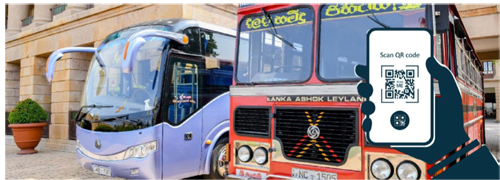Hitting the road with QR code: Facing challenges and moving with the times
 QR code technology plays a vital role in many economically developed countries making their public transport systems more convenient. However, the recent announcement of a pre-paid E card based on QR codes to be introduced to Sri Lankan passengers for the first time by the Ministry of Transport and Highways is bound to be hotly debated.
QR code technology plays a vital role in many economically developed countries making their public transport systems more convenient. However, the recent announcement of a pre-paid E card based on QR codes to be introduced to Sri Lankan passengers for the first time by the Ministry of Transport and Highways is bound to be hotly debated.
Buses and trains are the most widely used mode of public transit in Sri Lanka. Buses are run by Sri Lanka Transport Board (SLTB) and private bus operators. This newly introduced QR system is expected to overcome corruption and malpractices by conductors and transportation staff while issuing cash tickets for the general public. The Minister of Transport and Highways emphasised that drivers and conductors in both buses and trains have failed to transfer the stipulated revenue fares to the relevant depots. A major complaint by passengers is of not receiving their balance from conductors when they purchase tickets. Significantly, with this QR system, passengers can purchase their tickets without making direct financial contact with the conductors.
Accordingly, the existing problems in the manual ticket system can be minimised to a certain extent using the new system based on QR codes. Minimising the use of printed tickets would also lead the country on an ecologically friendly pathway and be an alternative to the recent problem of scarcity of paper due to the ongoing economic crisis in the country.
The endless queues line up daily in front of the ticketing counters at railway stations would also be minimised. Most significantly, due to the low human interaction in purchasing and issuing tickets, human errors would be avoided. Considering all these factors, establishing a QR based transportation system would make daily lives of the public more efficient.
Nevertheless, since we live in a digitalised era where the rest of the world is moving forward with Artificial Intelligent (AI) technology, even though we are already late in adopting this new code system which has been implemented by many countries years ago, it is questionable whether we have enough technological knowledge, resource personnel and the technological cost to implement and sustain the project.
Secondly, even if the government could successfully manage the technical issues of the QR system with global support, it is essential to evaluate the public response regarding the challenges they would face in this technological transition. The majority of senior citizens over 65 and children below 12 do not use smart phones. Thus, there is also a matter of social equality in how people embrace the new technology.
Also, due to the shortage of public transportation in the country, buses and trains are often overcrowded and consequently conductors will obviously face much difficulty in scanning QR codes when there is network traffic. The experience of Indian bus conductors with the recently launched QR system in India has not been that successful. “Some passengers show their mobile screen and claim they’ve paid the fare but it doesn’t reflect in the BMTC account when we tally it at the end of duty hours. Some even use previous transactions to get tickets from us. We end up paying from our pocket for such tickets, so I am not encouraging the QR-code payment mode,” a BMTC conductor has been quoted as saying. On the other hand the Indian public have also faced instances where the “BMTC claimed all its buses have the QR-code ticket facility, but when I asked a conductor he was a tad reluctant and insisted on cash transaction” (Phillip,2020).
Introducing a new facility particularly related to technology is a challenge in any developing country. However, if we fail to move parallel with this global competition, probably we will be lost in the game in the future.
In recent times, the QR code system was introduced to Sri Lankan drivers as an answer to the huge queues lining up at fuel stations as a consequence of the economic crisis. Initially, many were reluctant to use the system expressing various kinds of difficulties they faced. But after a few months, we find the situation has changed.
Therefore, this would be an initial effort to opening up the mindset of the public towards a new phase of digitalisation of the country. Accordingly, the government should focus more on decision-making particularly based on participation prior to implementing the rules and regulations and also assess the pros and cons of their decision. As we are passing through an era of rapid digitisation, it is time to take a smarter move on E-transportation facilities with more emphasis on accountability and transparency on the part of the government.
Searching for an ideal partner? Find your soul mate on Hitad.lk, Sri Lanka's favourite marriage proposals page. With Hitad.lk matrimonial advertisements you have access to thousands of ads from potential suitors who are looking for someone just like you.


